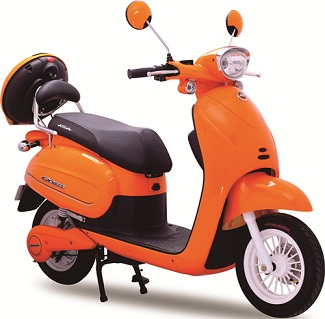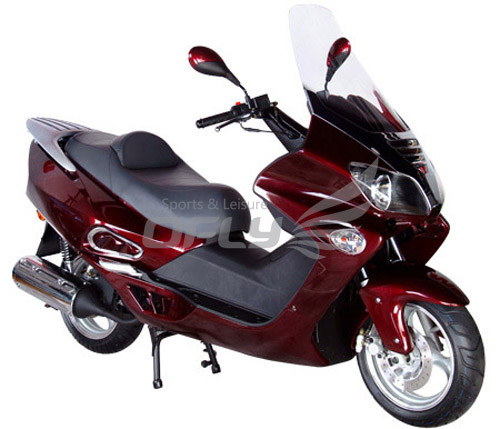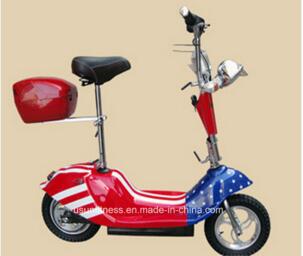Home Scooter News The pros and cons of each type of Electric Scooters vs Gas Scooters
The pros and cons of each type of Electric Scooters vs Gas Scooters
May 06,2016
It's the question on everyone's mind… do I go gas or electric! There are many factors to consider when purchasing a motorized scooter. Whether you buy a gas scooter or an electric scooter is one of the first decisions you'll want to make. This section outlines the pros and cons of each type of Electric Scooters vs Gas Scooters.
COST: Electric scooters win the prize in the affordability category. As a general rule, an electric scooter that offers the same specifications as a gas scooter will be less expensive.
SPEED: Dollar for dollar, gas scooters have the advantage. You'll find electric scooter models that vary in speed from 8 mph to 25 mph, but electric scooters offering a speed in excess of 20 mph are very rare. On the other hand, gas scooters will zip along at speeds ranging from 16 mph to 30 mph.
NOISE: Electric scooters are the clear winner in this category. Gas scooters are quite loud and their noise level can be compared to a motorcycle, lawnmower or leaf blower. If noise is a concern, you should probably get an electric scooter. An electric scooter is very quiet and usually gives off a low humming sound rather than the high volume sound produced by gas scooters. If you must have a gas scooter and noise is a concern, try a gas scooter built with a California C.A.R.B. Tier 2 exhaust emission compliant motor. Gas scooter motors built to California C.A.R.B. standards are quieter.
ENVIRONMENTAL IMPACT: And the winner is by unanimous decision… electric scooters! If your goal is to help save the planet by reducing harmful emissions, then electric is the way to go. Gasoline scooters burn fuel which give off emissions that are harmful to our environment. However, gas scooters do produce fewer harmful emissions than your car. If you plan on keeping your car in the garage and commuting by gas scooter instead, then at least you're headed in the right direction. Gas scooters with motors built to California C.A.R.B. Tier 2 exhaust emission standards are cleaner burning than standard gas scooters.
USABILITY: There's no clear winner here although electric scooters do have an edge. While electric scooters get their power supply from an electrical outlet, gas scooters require the handling of fuel. Typically gasoline is mixed with two stroke engine oil to properly fuel a gas powered scooter. If you're uncomfortable handling flammable liquids then gas powered scooters are probably not for you.
DURABILITY: Gas scooters tend to have the advantage here. Generally speaking gas scooters are more durable because they must handle higher speeds and are more likely to be used off road.
RELIABILITY: Neither electric scooters or gas scooters have an obvious advantage here. The key is to stick with a quality brand name motorized scooter and to avoid off-brand scooters, no brand scooters and clones. Off-brand scooters, no brand scooters and clones generally offer extremely poor reliability.
SAFETY & LEGAL ISSUES: Both electric scooters and gas scooters require attention to safety guidelines and local laws. Laws regarding motorized scooters vary from state to state and it's best to contact your local DMV or law enforcement agency for the laws in your area. Gas scooters that don't comply with California C.A.R.B. Tier 2 exhaust emissions standards are illegal for use in the state of California for other than closed course competition purposes.

IN CONCLUSION: The type of motorized scooter that's best for you depends partly on how you plan on using the motorized scooter and partly on personal preference. To help make your decision a little easier, consider the following information:
Electric scooters are much quieter than their noisy counterparts. No warm-up time is required when starting an electric scooter. Electric scooters are easy to use and don't require the handling of fuel. They only cost about five cents per day to charge. Electric scooters are allowed on public transit, such as buses, trains, and planes, whereas gas scooters are typically not allowed by law. Electric scooters are environmentally friendly and don't have that 'gasoline smell'.
Gas scooters offer more power and speed. They are lighter in weight and usually have a smaller frame and higher carrying capacity. Gas scooters tend to have greater range and outperform electric scooters on hills and rough terrain. A gas scooter is more convenient than an electric scooter in that you can simply fill it up at your local gas station and get back on the road. An electric scooter must be recharged through an electrical outlet and charging can take from four to eight hours depending on the scooter.
There you have it, the basic pros and cons of buying an electric scooter versus a gas scooter. Simply weigh the advantages and disadvantages and decide which type of motorized scooter will best suit your needs.

